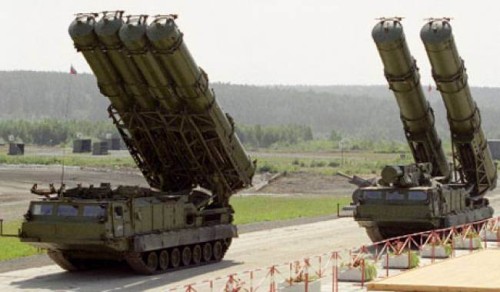PHOTO: Russian S-300 anti-aircraft missile systems
UPDATE 1745 GMT: Iranian Defense Minister Hossein Dehqan said on Tuesday that the first Russian S-300 missile systems will be delivered to Tehran by the end of 2015.
Speaking to reporters, Dehghan said the “executive stage” of the agreement for the delivery has been completed and Iran will receive a “major part” of the shipment in less than two months.
Dehghan said this summer that the first S-300s would arrive by December 31, but Moscow poured cold water on the statement.
Western media excitedly declared on Monday that Russia has lifted a five-year suspension and agreed to deliver S-300 anti-aircraft missiles to Iran — but it appears the story is overblown.
The headlines sprang from a Financial Times interview with Sergey Chemesov, the chief executive of Rostec, Russia’s largest defence contractor, in which he said that “the contract has been signed”.
However, there was no support for the declaration from either the Russian Government or Iranian regime, and the follow-up from Chemesov, who is attending the Dubai Air Show, was far from definitive: “I think that by the end of next year we will start deliveries of the S-300.”
See also Iran and Syria Audio Analysis: The Politics Around Russia’s S-300 Missiles
In April, President Vladimir Putin suddenly said he was lifting the ban on the sales of the S-300s, and both Russian and Iranian officials have made general statements throughout 2015 that the deliveries could resume next year. Iranian Defense Minister Hossein Dehghan even said at one point that the first S-300s would arrive by the end of 2015.
On each occasion, Moscow stepped back from a commitment to delivery. The contract was first signed in 2010 but was suspended in 2010 by then-President Dmitri Medvedev, with Russia refunding $800 million to Iran.
Tehran subsequently filed a lawsuit for $4 billion over the suspension. Chemesov is one of the Russian officials named in the case.
Politics Around the Deal
Part of the reason for the Western media’s excitement was that Chemesov’s statement came as Israeli Prime Minister Benjamin Netanyahu was holding talks with President Obama in Washington.
The S-300s would be an effective deterrent to Israeli airstrikes on Iran, which Netanyahu reportedly sought in 2012.
Netanyahu’s office offered no comment on Monday to the Financial Times.
Meanwhile, Russia and Iran are involved in a significant escalation in the Syrian crisis, with Moscow launching airstrikes from September 30 and Iranian commmanders and troops involved in the Syrian military’s six-front offensive against rebels and the Islamic State.
See Syria Analysis: Is Russia Preparing to Dump Assad?
The Assad regime has declared on occasion that it expected S-300s from Russia, but Moscow has never indicated that it would provide the missiles. The anti-aircraft systems would likely be considered a threat to the US-led coalition which is carrying out attacks against ISIS, to any Turkish intervention, and to Israel’s warplanes.

